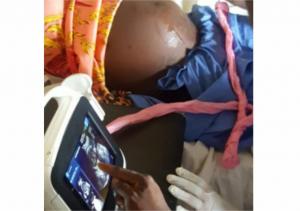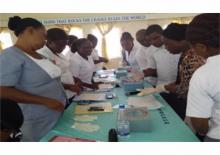Improving access to quality maternal health services at primary level of care in Cross River State
Cross River, October 19, 2020- “I used to deliver all my children at home or with the traditional birth attendant. After learning that our Primary Healthcare Center (PHC) had new health workers and now have scan services, I had to come and see for myself. After I did the first scan and showed my husband the result, we both agreed that we will continue my Ant-natal Care (ANC) at the PHC facility. I started going for ANC checkup and had more scans, and eventually decided to have my baby delivered at the healthcare facility” says patient Mary Oqua who had her last delivery in PHC Ediba, Odukpani Local Government, Cross River State.
All her previous deliveries were with untrained traditional birth attendants and she mentioned that this was the easiest and less complicated childbirth she has ever had.
Another beneficiary, Eno Effanga Qaya who had her sixth delivery in Ediba PHC mentioned that “before, we had to take transport to get to the bigger hospitals to have our scans. We are happy that this is no longer the case, we can now have our scans very close by.”
These interventions have increased the utilization of maternal health care services in PHC facilities in Odukpani LGA of Cross River state, many women who used to deliver at home and at traditional birth attendants now prefer to deliver their babies in the PHC facilities, and the uptake of family planning services has also increased.
According to NDHS 2018 infant mortality rate was 67 deaths per 1,000 live births and 40 000 women die from pregnancy-related causes each year. Many of these deaths could be prevented if frontline health workers at the primary care level can use ultrasound services to detect complications early.
For many pregnant women in Nigeria, receiving quality ANC services from qualified, skilled and motivated health workers is essential to the health of the mother and baby. However, access to these services are limited to women of child bearing age in rural PHCs due to the shortage of qualified and skilled health workers resulting in many women having to travel considerable distances to health facilities in urban areas to access services.
To address this demise, the World Health Organization (WHO), with funding from the Government of Canada through the Global Affairs Canada, supported the Cross River State health sector to implement strategies aimed at improving health workforce governance, coordination and planning. The project created an enabling environment for the formation and strengthening of a health partner’s coordination forum which has improved the collaboration between the state government and partners to address human resources for health challenges.
This collaboration led to the development of the State Task Shifting and Sharing policy and its implementation. Capacity building of frontline health workers were conducted in line with the shifted/ shared tasks, including 115 frontline health workers trained on emergency obstetrics and neonatal care (EmONC) and essential newborn care. Other partners also supported the implementation of the policy through the enhancement of skills for ultrasound diagnostics at primary care level.
These actions have eradicated the need for patients to travel distances to have scans, and to detect potential pregnancy complications.
Mrs Theresa Esu, a Nurse at PHC Odukpani stated that “since we were trained to perform scanning in this PHC, a lot of the pregnant women in the communities now come here for scans and other maternal health services. We have been able to make early and accurate diagnosis of complications and promptly referred such cases to the higher hospitals.”
Service delivery data from the LGA indicates that from 2015 to 2019, the number of women delivered by skilled birth attendants in Odukpani LGA rose from 807 to 1 242, number of new family planning acceptors increased from 18 135 to 23 997 and the number of women who had implant insertion increased from 63 to 7 854.
Technical contacts:
Dr Ufere Joy; Email: uferej [at] who.int (uferej[at]who[dot]int); Tel: +234 803 979 5143
Dr Okoroafor Sunny; Email: okoroafors [at] who.int (okoroafors[at]who[dot]int); Tel: +234 803 747 6449




